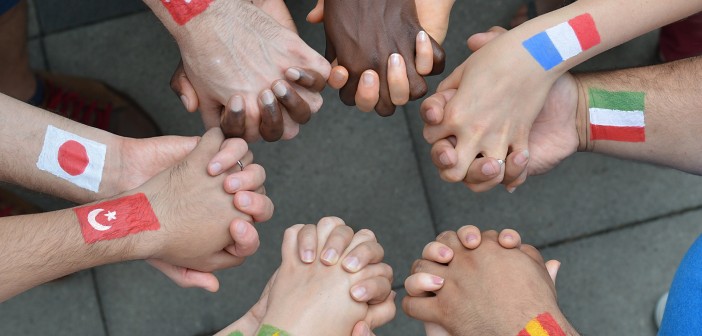The Bible has much to say about community. In the very act of creating humanity, God initiated community. For community to have the equality that God expects, everyone must have a voice. This means those who have power in society (or the church), and thereby already have a voice, will need to listen more. Those who have been voiceless in society will have to become emboldened by the Spirit to speak.
One result of multicultural fluency is a greater awareness of our similarities. While there are many cultural expressions, there is only one human family. It is necessary for us to be fluent in a diversity of cultural understandings.
Those of us who have a strong psychological need for receiving credit for our ideas and contributions will want to learn how to place the need for community above our own egos. A focus on individual accomplishments should be replaced by a community-centered agenda. When ideas are considered community property and no one needs to claim ownership of what they share, we are closer to realizing koinonia. In such a community, roles are based on gifts, with individuals leading in the areas of their giftedness. Everyone has a voice, and all the glory goes to Jesus Christ.
To create an environment where everybody’s voice is heard, we will need to become skilled at what James Earl Massey calls “the discipline of dialogue.” Massey says, “Dialogue is the way of community. It is the personal dimension of sharing. Dialogue concretizes the will to be in relation with another person.… Dialogue is the way of explored intention, the way of God who is always seeking to share himself with others.”
For a community that values equality to develop, we will need to believe that every person is created in the image of God and therefore has dignity, worth, and something of value to share. So we must develop the art of listening. This will be particularly challenging as we try to listen to those whose experience in life is very different from ours. As we dialogue with people from different cultural perspectives, we will need to learn how to listen to voices and melodies that are unfamiliar to us. These voices may hold the keys to unlocking the doors that open our minds to the essential components for creating our desired unity. The more inclusive the dialogue, the richer the content and the stronger the outcome.
There are bound to be differences and disagreements when people dialogue. When everyone is given a voice, a greater number of outlooks are laid out on the table. These are the moments that reveal whether our respect for the other person is genuine. For unity to be maintained, we must sincerely believe that people can disagree and still love God. A spirit of community requires that we accept that all are doing their best to understand and apply their faith in this complex world and leave the judging to God.
If we are to practice the discipline of dialogue in this diverse world, we must become fluent in cultures other than our own. This was the genius of the apostle Paul, who developed the ability to understand and communicate with people from different cultures and experiences. How do we become fluent in other cultures? One way this happens is when we live outside our comfort zones and relate in significant and ongoing ways to people who are different from us. Our fluency expands as we listen to and live with people from diverse settings. This helps us gain points of reference for communicating cross-culturally. If possible, we need to be mentored by persons who are from cultural or racial groups different from our own.
One result of multicultural fluency is a greater awareness of our similarities. While there are many cultural expressions, there is only one human family. It is necessary for us to be fluent in a diversity of cultural understandings. Yet there are times when our distinctive cultures must be worn like loose garments. We must be able to interact free from culture in a manner that is simply “human.” The freedom to interact as sisters and brothers in the family of God, liberated from the impediments of our differences, but not discounting our cultural uniqueness, may be the most important foundation for future community.
This article is adapted from Curtis’s book Coming Together in the 21st Century: The Bible’s Message in an Age of Diversity, Judson Press, 2009, used by permission. Shop for DeYoung’s book at Amazon or at Cokesbury.






